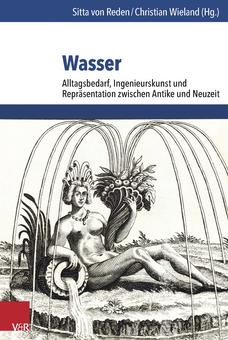von Reden, Sitta, and Christian Wieland (eds.). Wasser: Alltagsbedarf, Ingenieurskunst und Repräsentation zwischen Antike und Neuzeit. Umwelt und Gesselschaft, edited by Christof Mauch and Helmuth Trischler, vol. 14. Göttingen: Vandenhoeck & Ruprecht GmbH & Co, 2015.
This volume offers a comparative perspective on the control of water and water supply as political means of stabilizing, legitimizing and representing power. Water is a scarce and at the same time un-substitutable means of life whose successful control can help to demonstrate the success of political régimes. Ancient, Early Modern and modern states did and still do use this opportunity to stabilize their power, while aesthetically appealing or materially impressive hydraulic works of engineering visually encapsulate that power. But their building also mobilizes and concentrates manpower, taxes and know-how so that successful water control and state-building were interrelated processes. (Text adapted from Vandenhoeck & Ruprecht and the Rachel Carson Center)
Read an excerpt here.


